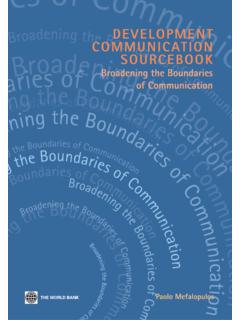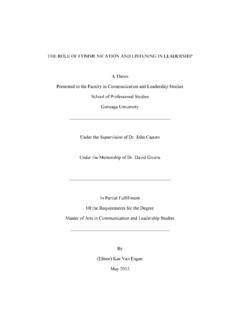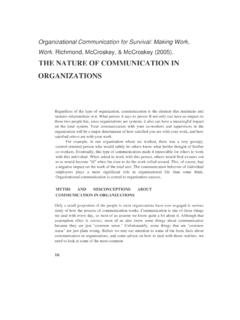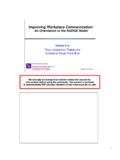Transcription of Why Communication Education is Important: The Centrality ...
1 Why Communication Education isImportant: The Centrality of theDiscipline in the 21st CenturySherwyn P. Morreale & Judy C. PearsonThis study provides a rationale for the claim that Communication instruction is critical tostudents future personal and professional success. Thematic analysis of 93 journal andnewspaper articles, reports, and surveys provide evidence of the Centrality of commu-nication in developing the whole person, improving the educational enterprise, being aresponsible social and cultural participant in the world, succeeding in one s career and inbusiness, enhancing organizational processes and organizational life, and, addressingseveral emerging concerns in the 21st century including health Communication , crisiscommunication, and crime and policing. The results of this study are compared to thethemes identified in a similar study published in : importance of Communication Instruction; Centrality of CommunicationDiscipline; Rationale for Communication Education ; Communication in HigherEducation; Role of Communication EducationUnderstanding how people use messages to generate meaning within and acrossvarious contexts, cultures, channels, and media (Korn, Morreale, & Boileau, 2000) isan issue of vital importance in contemporary society.
2 Scholars outside of thecommunication discipline bear witness to the Centrality of Communication educa-tion. McCloskey (1994), a professor of economics, argues that speech or talk hasbecome central in society, and hence, Communication is one of the most pragmaticfields of study in academia. McCloskey presents three basic premises to support hisclaim: a nation of new minorities needs better Communication ; we are living in aSherwyn P. Morreale ( , University of Denver, 1989) is an Assistant Professor and Director of GraduateStudies in the Communication Department, University of Colorado at Colorado Springs. Judy C. Pearson( , Indiana University, 1975) is Associate Dean of Arts, Humanities, and Social Sciences and Professor ofCommunication, North Dakota State University. The authors acknowledge the seminal research of MichaelOsborn in shaping the first iteration of this study in 2000 and contributions to the present study of researchassistants, Mildred E.
3 Green, Robert Becker, Jeffrey T. Child, Katherine L. Gronewold, and Nadene N. P. Morreale can be contacted at 0363-4523 (print)/ISSN 1479-5795 (online)#2008 National Communication AssociationDOI: EducationVol. 57, No. 2, April 2008, pp. 224 240communications revolution comparable to the invention of printing; and manypeople now earn their living from talk. McCloskey concludes that communicationstudies are central to interdisciplinary research and pressing need exists for Communication instruction at all levels of the system. This assertion requires evidence to show that communicationcourses have the potential to improve the quality of Communication in this requisite, an earlier study found support for the Centrality of thecommunication discipline (Morreale, Osborn, & Pearson, 2000).
4 These researcherscollected and published annotations of 99 articles, commentaries, and publicationsspanning from 1955 to 1999, all of which demonstrated the importance of the studyof Communication . Four of five major themes in that annotated bibliographyprovided support for the importance of Communication Education . The themes arelisted here in the same order that they were presented in the original study, althoughthey are not listed in the order of frequency. These themes include:(1) The development of the whole person (17 references). This theme suggested thatcommunication Education plays a key role in self-development by enhancingrelationships with one s self, others, and society, and by improving relatedcommunicative skills.(2) The improvement of the educational enterprise (seven references).
5 This themesuggested that Communication Education enhances the quality of classroominstruction and is key to successful collaboration in educational environments.(3) Being a responsible participant in the world, both socially and culturally (eightreferences). This theme suggested that Communication Education is vital to thedevelopment of skills and sensitivities that shape our social and political lives,help society s positive continuance, and erase cultural boundaries.(4) Succeeding in one s career and in the business enterprise (50 references). Thistheme suggested that Communication Education and skills are fundamental tocareer success and upward mobility in multiple fifth theme in the 2000 study highlighted the need for Communication educationto be provided by those who are specialists in its study (15 references).
6 Most would agree that competence in oral Communication is prerequisite toacademic, personal, and professional success. However, while humans are born withthe ability to vocalize, they are not born with a full accoutrement of the knowledge,attitudes, and skills that constitute Communication competence. The ability tocommunicate effectively and appropriately is learned and, therefore, can and shouldbe taught. The discipline of Communication is well positioned to address students personal, educational, and professional development. Simply stated, the commu-nication discipline is viewed as central to the goals of the educational provide recent evidence and support for such a claim, this study updates theearlier efforts of Morreale et al. (2000). While only seven years have passed since theoriginal study, the world has changed dramatically.
7 Modern life and the role ofcommunication have been affected by catastrophic events, such as the terrorists Why Communication Education is Important225attacks of 9/11 and the outbreak of violence on high school and college events have resulted in heightened interest in dimensions of Communication ,such as risk and crisis Communication , negotiation, and conflict , new Communication technologies are connecting people around the worldand reshaping how we work, play, and communicate. The Millennial generationneeds training in skills required to navigate a global world, including competenciesrelated to electronic and intercultural York Timescolumnistand best-selling author, Thomas Friedman (2006), talks about what college graduatesneed to know and be able to do in order to be successful in the 21st century:You need to like people.
8 You need to be good at managing or interacting with otherpeople. Although having good people skills has always been an asset in the workingworld, it will be even more so in a flat world [advances in technology andcommunication putting diverse people in touch as never before]. That said, I amnot sure how you teach that as part of a classroom curriculum, but someone hadbetter figure it out. (p. 106)The Communication discipline has figured it out and now needs to promulgate thisknowledge to society. We in the discipline need to argue soundly and provideevidence of the importance of our subject in 2000, the purpose of this study is to provide Communication instructors andadministrators with a solid rationale for Communication Education based on itsimportance in contemporary life and society. Articles, commentaries, and publica-tions from an array of sources, all of which emphasize the need for communicationskills and Communication instruction, have been examined and organized themati-cally.
9 The sample in this study included 93 journal and newspaper articles, reports,and surveys that have utilized both qualitative and quantitative methods. The contentand importance of each of six themes is provided in this report; and the themes arediscussed and compared to those identified in the earlier 2000 questions were addressed. Is Communication Education important incontemporary life and society? Do surveys, studies, and reports identify the samerationale for the importance of Communication instruction as did the earlierannotated bibliography? As we advance into the 21st century, do different reasons forour discipline s presence and Centrality in the educational system emerge? Finally, andperhaps most important , what recommendations might we proffer that would makeour discipline more meaningful and better understood by administrators, othereducators, and employers?
10 MethodThis study replicated the method used in the 2000 study with regard to datacollection (Morreale et al., 2000). Data analysis varied from the earlier study in thattwo raters, rather than one, were used to categorize annotations of the P. Morreale & J. C. PearsonData CollectionThe writings included in this study were derived from a comprehensive search of bothacademic and nonacademic literature from 1998 through 2006. First, a search ofacademic journal articles was conducted using a variety of electronic databasesincluding EBSCO Host s Communication and Mass Media Complete; Sage Publica-tion s full text collection, Communication Studies; Business Source Premier;PsychInfo; the general databases Academic Search Premier, Expanded Academic,and WilsonWeb; and Communication Abstracts.









